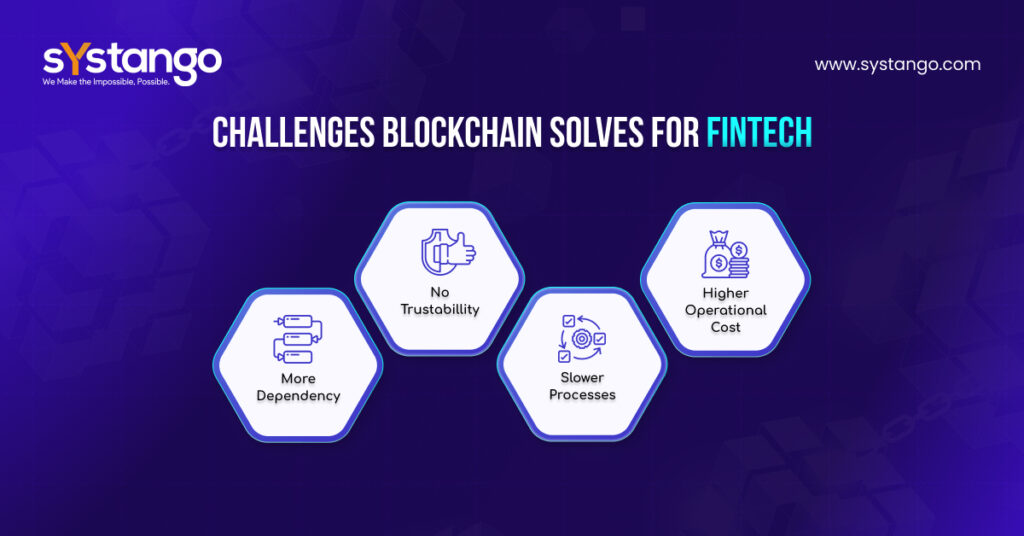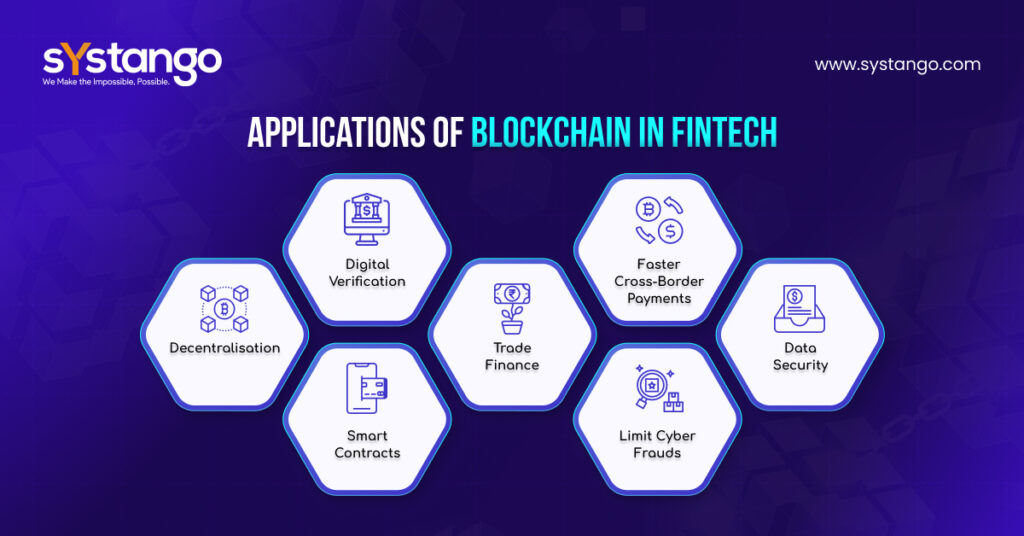Blockchain: A Dependable Technology for Fintech Industry
Published on 11 Nov 2022

Blockchain: A Dependable Technology for Fintech Industry
The global market for fintech blockchain was estimated at US$1.1 BN in 2021, which is projected to be US$8.7 Billion by 2030, with CAGR of 43.8%.
Just like any other, the fintech industry is witnessing the transformative impact of blockchain technology. With products and services based on blockchain, the financial sector is aiming at the following things:
- enhancing the end-user experience,
- generating more revenue,
- bringing efficiency in the delivery process, and
- reducing risks in business operations.
Within this blog, we will help you out with the challenges that blockchain development will solve for the fintech industry and the use cases of blockchain that can be incorporated into the fintech industry.
Challenges that Blockchain Addresses For the Fintech Industry

The financial sector has been observing a lot of challenges such as long-fund raising cycles, missing targets, and growing losses, which are majorly caused due to mismanagement. But the introduction of blockchain technology in the financial sector is bound to address the following challenges:
Trust Factor: Traditional transactions on fintech applications deliver zero transparency to the user on what exactly happens on the other side, which leads to the rising fear of identity theft or confusion on how transactions are taking place. Blockchain in fintech will resolve it with its core characteristics of immutability and transparency.
Dependence on a Centralized System: Third parties or middlemen have always been the ones who have enjoyed the power within fintech solutions. Users have predominantly criticised the centralised system for being biased. The advent of blockchain in fintech will resolve this with decentralization at its core.
Higher Operation Cost: When discussing the financial market, time is also referred to as money. Saving time would ultimately reduce operational costs. The introduction of blockchain in fintech will not only cut down the dependency on multiple people but also will make the whole process public and reduce the associated time (thereby the cost associated with it).
Slower Processes: We all have seen delays in money transferring or the transactions that we do. These majorly happen due to the involvement of multiple third parties. Such processes have been the reason for lower satisfaction rates and higher turbulency in the business economy.
What exactly does Blockchain offer in Fintech?

With immutability, security, and transparency, blockchain offers a range of applications in fintech. Let’s quickly have a look at a few of the use cases it being incorporated by the fintech experts:
Decentralisation
Traditional financial institutions charge a basic transaction fee for transacting or using our own money. There are many terms and regulations implemented by the central authorities, for which users have to pay additional fees.
As per experts, Blockchain applications will provide a way to transfer money anywhere globally at a significantly reduced cost. Since the technology operates on peer-to-peer transactions, it eliminates all intermediaries, ultimately reducing additional costs. Moreover, the decentralised structure will hand over complete control of money to the owner (not any centralised authority).
Digital Verification
Private keys on blockchain help end-users in managing their digital identity. Post the registration process, the users can quickly transfer funds or data through their unique private keys. The process eliminates all the risks of making a wrong transaction. So, the users will never have to worry about sending money to the wrong person.
Smart Contracts
Considered as one of the most remarkable applications of blockchain technology, smart contracts are a piece of code that are self-executing pieces of code. This auto-implementation feature introduces integrity within the blockchain network.
For instance, a finance company providing loans can develop a smart contract with certain conditions (such as interest rates, tenure of loans, and other prerequisites). If the customer is not able to repay the loan on the agreed terms, the smart contract will be triggered and the amount associated will be increased with an interest amount.
Trade Finance
TradTech is another vertical where blockchain technology can replace middlemen such as Demat agents, stock exchange dealers, or brokers. They obviously have been in the news for associated risks and shady tactics.
The introduction of blockchain technology in trading will help in achieving the following:
- Reducing stock cycle loopholes by bringing transparency
- Making the process hassle-free with decentralisation
- Bringing security to the stock exchange with immutability
Quicker Cross-Border Payments
Current bank transfers demand entities of banks to check and verify the account details, status, availability of money in the account to process the transaction. Currently, this does not take much time but what if we have to make cross-border payments?
With the current traditional system, cross-border payments are bound to take a lot of processing time, which can be reduced with blockchain. Making transactions on a single blockchain network will give quick access to any or every data required for transactions; making cross-border payments swift and simpler.
Dodging Cyber Frauds
Even a single breach of financial institutions or any fintech company can cause a lot. Blockchain has pre-dominated the market with its security feature. It successfully stores and transfers data using cryptographic hash functions; cracking which is not easy.
Moreover, the blockchain holds data in the form of a chain, which makes it difficult for anyone to alter the data. With data getting saved in the form of blocks, it becomes difficult for any hacker to penetrate the network and steal data.
Data Security
The Fintech sector is known for its audit cycle and review process, which consumes a lot of time. With blockchain in the picture, all the data will be added in new blocks and no old blocks would be hampered. Within this infrastructure, anyone can access or upload the data and conduct a quick and seamless audit.
Takeaway
The capabilities of blockchain are still being explored and it has taken many industries by storm, hence it has been termed one of the revolutionary technologies for almost all industries.
Be it financial institutions of different sizes or startups, they should seek guidance for integration and leveraging the power of advanced technologies such as blockchain into their business model. Integrating such technologies within one’s business infrastructure will set new benchmarks of cost reduction, improved productivity, and customer satisfaction across the value chain.
If you are looking for a blockchain solution for financial software development, we can help you!
Related posts
Blockchain
Blockchain Development Services for Enterprises: Unlock Efficiency, Trust, and Real Business Impact
21 May 2025
Blockchain
Web Apps
NFT
App Development
The Ultimate Guide to Hiring Blockchain Developers in 2025: Skills, Costs, and Models
15 Apr 2025
Let’s talk, no strings attached.